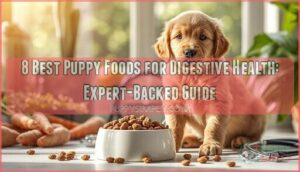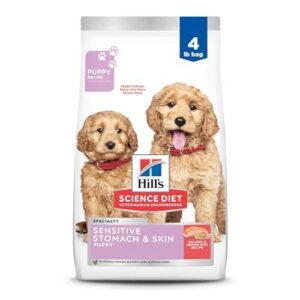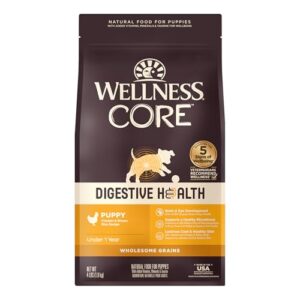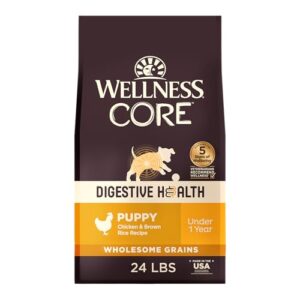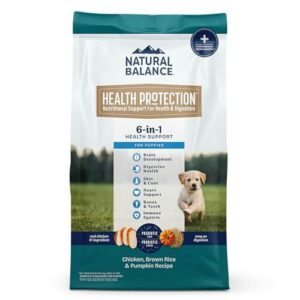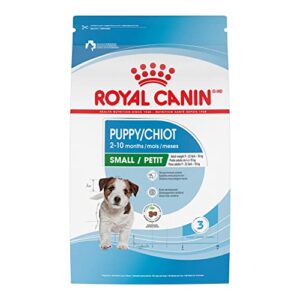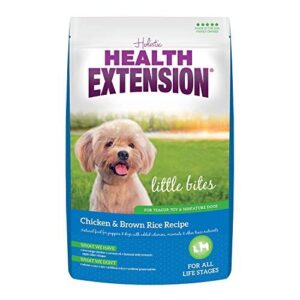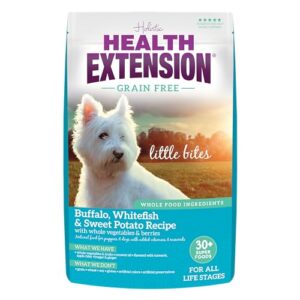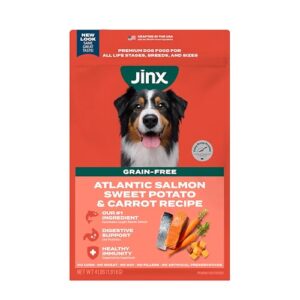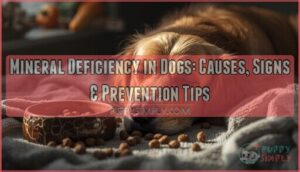This site is supported by our readers. We may earn a commission, at no cost to you, if you purchase through links.
Your puppy’s digestive system isn’t just about processing food—it’s the foundation for everything from bone strength to immune resilience. Research reveals that 54% of puppies show measurably better absorption of fats and proteins when fed highly digestible formulas, a difference that compounds over critical growth phases.
Yet many puppy owners unknowingly choose foods that compromise nutrient extraction, setting the stage for chronic sensitivity issues or developmental gaps. The gap between adequate nutrition and peak digestion often hinges on specific ingredients: easily digestible proteins, prebiotic fibers, and targeted enzymes that work together to support your puppy’s rapidly developing gut microbiome.
Understanding which formulas deliver these components—and how to evaluate quality beyond marketing claims—gives you the tools to support vigorous digestive health from day one.
Table Of Contents
- Key Takeaways
- Importance of Digestive Health in Puppies
- Key Ingredients for Puppy Digestive Wellness
- Common Digestive Problems in Puppies
- How to Choose Puppy Food for Digestive Health
- Top 8 Puppy Foods for Digestive Health
- Feeding Strategies for Optimal Puppy Digestion
- Frequently Asked Questions (FAQs)
- How often should I deworm my puppy?
- What are the signs of digestive upset in puppies?
- Can I give my puppy probiotics or digestive enzymes?
- How do I transition my puppy to a new food?
- What is the best way to clean up puppy diarrhea?
- Can homemade diets support puppy digestive health?
- Do different breeds have unique digestive needs?
- How does water intake affect puppy digestion?
- Are treats safe for puppies with sensitive stomachs?
- What role does exercise play in digestion?
- Conclusion
Key Takeaways
- Your puppy’s digestive system directly determines nutrient absorption rates, with highly digestible formulas showing 54% better fat and protein uptake within seven days—a difference that compounds during critical growth phases and shapes bone strength, immune resilience, and long-term health outcomes.
- Optimal puppy foods combine easily digestible proteins (like chicken, salmon, or turkey), prebiotic fibers, probiotics, and digestive enzymes that work synergistically to reduce diarrhea by 20-30%, improve stool quality by 22%, and cut gastroenteritis episodes by 15% compared to standard formulas.
- Gradual food transitions over 7-14 days reduce vomiting episodes by up to 70% in sensitive puppies, while feeding 3-4 smaller meals daily decreases gastrointestinal burden and vomiting by 12-25% compared to fewer, larger feedings.
- True food allergies affect only 2-10% of puppies, but eliminating common allergens (beef, dairy, chicken) and artificial additives resolves digestive issues in 60-70% of sensitive stomach cases, making ingredient scrutiny more impactful than brand recognition when selecting puppy food.
Importance of Digestive Health in Puppies
Your puppy’s digestive system isn’t just about processing food—it’s the foundation for lifelong health and vitality. A well-functioning gut determines whether your growing pup can absorb the nutrients needed for strong bones, a sturdy immune system, and steady energy.
Your puppy’s gut isn’t just about digestion—it’s the foundation for lifelong health, immunity, and vitality
Let’s look at three critical ways digestive health shapes your puppy’s development.
Role in Nutrient Absorption and Growth
Your puppy’s gut health directly drives growth optimization and overall wellness. When digestive efficiency is high, nutrient uptake improves dramatically—research shows 54% of puppies absorb fats and proteins better within just seven days on highly digestible formulas.
This microbiome balance ensures proper gut development, allowing your growing pup to extract essential vitamins, minerals, and energy from every meal, following sound nutritional guidelines for puppies and supporting vigorous canine nutrition.
A healthy diet is vital for maintaining research network balance in puppies.
Impact on Immune System Development
The gut microbiome in young dogs shapes immune system maturation in noteworthy ways. Early-life bacterial composition influences circulating T-cell profiles and antibody production—puppies with balanced gut health often show stronger vaccine responses and better-developed mucosal defenses by 12 weeks.
Probiotic effects during weaning can boost immune readiness, while microbial diversity predicts lower inflammation risks as your pup grows.
Understanding the importance of a research question is vital for making informed decisions about puppy nutrition.
Preventing Common Digestive Issues
Building on this immune foundation, you can head off many digestive issues with proactive dietary management. Puppies with sensitive stomachs respond well when you shift foods gradually over 7–14 days—cutting vomiting episodes by up to 70%. Probiotic support and digestive enzymes offer digestive relief by resolving diarrhea roughly 1.2 days faster than standard diets.
- Feed 3–4 meals daily to reduce GI burden and vomiting by 12–25%
- Choose puppy sensitive stomach food with easily digestible proteins to boost nutrient absorption 18–25%
- Avoid common allergens (beef, dairy) that trigger digestive issues in 8–12% of puppies
- Monitor stool consistency—scores of 3–4 signal healthy gut health and proper adaptation
Key Ingredients for Puppy Digestive Wellness
When you’re choosing food for your puppy’s sensitive stomach, the ingredient list matters more than the marketing claims on the front of the bag. Certain nutrients work together to soothe digestive upset, support a healthy gut microbiome, and help your puppy absorb what they need to grow.
Let’s look at the key ingredients that make a real difference in digestive wellness.
Easily Digestible Proteins and Carbohydrates
Your puppy’s stomach thrives when you choose the right protein sources and carbohydrates. Highly digestible chicken protein improves nutrient absorption by 12–18% compared to bone meal alternatives, while rice-based formulations excel over wheat for digestive relief. These ingredients support gut health by firming stools within seven days.
Duck, turkey, and fish offer comparable benefits, making them excellent puppy food options for sensitive stomachs and ideal carbohydrate digestion.
Benefits of Prebiotics and Probiotics
Balance in the microbiome is the foundation your puppy needs for thriving gut health. Synbiotic benefits emerge when prebiotic fiber and probiotic supplements work together—trials show stool quality improves by 22% and gastroenteritis drops 15% in supplemented puppies.
- Prebiotic fiber fuels beneficial bacteria, raising protective fatty acids by 18%
- Probiotic supplements restore microbiome balance during diet transitions
- Digestive health strengthens as combined formulations reduce diarrhea 20–30% long-term
Role of Omega Fatty Acids and Digestive Enzymes
Omega-3 fatty acids—EPA and DHA—reduce intestinal inflammation by up to 25%, supporting delicate digestive tissues during growth. You’ll want ratios near 5:1 to 10:1 (omega-6 to omega-3) for ideal gut barrier function.
Enzyme supplements targeting amylase, protease, and lipase improve fat and protein absorption by 12–15% in sensitive stomachs, especially when combined with hydrolyzed protein diets for thorough digestive health management.
Avoiding Common Allergens and Irritants
Food allergies strike 2–3% of puppies, often triggered by beef, dairy, or chicken—proteins that cause vomiting, diarrhea, or itchy skin. Draft veterinary guidelines suggest novel proteins and limited-ingredient diets reduce allergen exposure during 8–12 week trials.
Eliminating artificial colorings and certain preservatives resolves digestive issues in 60–70% of sensitive stomach cases, helping you avoid food sensitivities and prevent recurrent digestive reactions.
Common Digestive Problems in Puppies
Puppies can develop a range of digestive issues that signal their systems aren’t handling food quite right. You’ll want to recognize these problems early so you can adjust their diet before minor upset turns into something more serious.
Let’s walk through the most common digestive challenges puppies face and what causes them.
Signs of Sensitive Stomachs
Recognizing the warning signs early can spare your puppy unnecessary discomfort. Sensitive stomach issues manifest through several telltale indicators that signal digestive distress:
- Intermittent diarrhea affecting 38% of sensitive puppies, often improving within 2–4 weeks with proper diet adjustments
- Vomiting episodes occurring in 25% of cases, usually triggered by new foods or treats
- Abdominal bloating and excessive gas reported in 18% of puppies with stomach sensitivity
- Recurrent soft stools observed in 29% of affected puppies, indicating potential malabsorption
- Weight fluctuations despite normal appetite, affecting 22% of sensitive puppies
These digestive issues often stem from food allergies and intolerances, making careful observation of gut health patterns essential for identifying vomiting triggers and diarrhea causes in your sensitive puppy.
Causes of Diarrhea, Vomiting, and Gas
Understanding what upsets your puppy’s stomach helps you protect their digestive health. Research reveals that gastrointestinal parasites—detected in 41% of young dogs—rank among the top causes of diarrhea and vomiting, with Giardia alone affecting 29% of puppies. Dietary indiscretion triggers approximately 19% of diarrhea cases when puppies raid trash or consume spoiled food.
| Cause | Primary Signs | Risk Factors |
|---|---|---|
| Parasite Infections | Diarrhea, malabsorption, weight loss | Outdoor exposure, raw feeding (3× higher risk) |
| Dietary Indiscretion | Vomiting (13.6%), diarrhea (19.1%), gas | Scavenging behavior, trash access |
| Gut Fermentation | Excessive gas, bloating, foul odor | High-meat diets, fermentable fibers, sudden changes |
| Aerophagia Issues | Flatulence, belching, abdominal discomfort | Rapid eating, brachycephalic breeds, competition |
| Environmental Exposure | Helminth infection (93.7% in raw-fed dogs) | Free outdoor access, uncooked meat consumption |
Aerophagia issues become particularly troublesome when puppies gulp food rapidly—brachycephalic breeds like Bulldogs swallow more air during meals, producing pronounced flatulence. Meanwhile, gut fermentation intensifies when diets contain poorly digestible ingredients or fermentable carbohydrates, generating foul-smelling gas through bacterial breakdown of indigestible substrates.
Environmental exposure dramatically elevates gastrointestinal problems. Puppies kept outdoors face substantially higher parasite burdens than indoor dogs, while those fed raw meat show helminth prevalences reaching 94% compared to just 38% in cooked-diet puppies. These sensitive stomach triggers often overlap—a puppy scavenging outdoors may contract parasites while simultaneously experiencing dietary indiscretion from consuming spoiled items.
You’ll notice that concurrent vomiting and diarrhea occurred in 10% of affected dogs in clinical studies, signaling that multiple digestive issues frequently compound one another. Recognizing these interconnected causes allows you to address gastrointestinal problems systematically rather than treating symptoms in isolation.
Food Allergies and Intolerances
While true food allergies affect up to 10% of puppies, food intolerance presents more commonly in sensitive puppies experiencing digestive issues. You can distinguish between them through systematic evaluation:
- Allergy testing combined with 8–12 week elimination diet trials identifies triggers in approximately 30% of canine atopic cases
- Hypoallergenic diets using hydrolyzed proteins minimize gut health disruption from food allergies and sensitivities
- Probiotic benefits emerge during transitions, though you’ll need veterinary guidance for sensitive stomach management
How to Choose Puppy Food for Digestive Health
Choosing the right puppy food for digestive health requires careful evaluation of several key factors that directly affect how well your puppy processes and absorbs nutrients. You’ll need to assess ingredient quality, verify nutritional completeness, and understand the differences between food formats.
Let’s examine the specific criteria that will help you make an informed decision for your puppy’s digestive wellness.
Ingredient Quality and Label Analysis
When choosing Puppy Sensitive Stomach Food, scrutinize labels carefully. Only 41% of formulas disclose digestible energy and protein digestibility data—key markers for Digestive Health Management.
Look for named Protein Sources rather than vague “meat meal.” Manufacturing Standards matter too, since 55% of brands use ambiguous natural flavors that may harbor hidden irritants.
Ingredient Transparency helps you follow Nutritional Guidelines for Puppies and support Dog Nutrition and Health effectively.
Complete and Balanced Formulas
After analyzing labels, you’ll want formulas that meet AAFCO Nutrient Profiles for growth—roughly 74% of commercial options do. Complete and Balanced Diets with Probiotic Support reduce GI disturbances by 15–30% in studies.
Formula Evaluation should confirm digestibility data and Digestive Enzymes when available.
Meeting Nutritional Guidelines for Puppies through these Balanced Diets fulfills Canine Dietary Needs and broader Puppy Health and Nutrition goals effectively.
Importance of Feeding Trials and Nutritional Analysis
Beyond label compliance, you’ll want proof your formula actually works. Puppies on foods validated by feeding trials show 15–20% better feed efficiency and 25–40% fewer diarrhea cases during early weeks. That’s real-world digestive outcomes, not just theory.
Look for products with:
- Published feeding trial data showing weight gain and stool consistency
- Independent nutrient analysis confirming digestive outcomes
- Post-market surveillance tracking puppy health and nutrition
- Documented reduction in digestion issues across multiple breeds
These Food Safety Standards matter when canine dietary needs meet developing stomachs.
Wet Vs. Dry Food Considerations
Food texture significantly influences how a puppy’s stomach responds. Wet food formulations contain 75–85% moisture, compared to dry kibble’s 10–12%, which directly affects digestion rates and nutrient retention. Mixed feeding—combining half wet and half dry food—results in intermediate stool scores in 8–12 week old puppies, offering flexibility when digestion issues arise.
| Factor | Wet Food | Dry Food |
|---|---|---|
| Moisture Content | 75–85% | 10–12% |
| Energy Density | 1,000–1,500 kcal/kg | ~3,800 kcal/kg |
| Palatability | 10–25% higher acceptance | Variable acceptance |
| Cost Per Calorie | 2–4× more expensive | More economical |
| Digestive Impact | Improved hydration, faster illness recovery | Better portion control, dental benefits |
Puppies with sensitive stomachs often thrive on texture variety paired with a gradual introduction of new foods. Abrupt switches can increase the risk of temporary diarrhea by 5–15%.
Top 8 Puppy Foods for Digestive Health
Now that you know what to look for in puppy food for digestive health, let’s examine specific products that meet these criteria.
The following eight foods have been selected based on their ingredient profiles, digestibility features, and formulations designed to support sensitive puppy stomachs.
Each option offers unique benefits customized to different nutritional needs and preferences.
1. Sensitive Stomach Puppy Food Salmon
When your puppy struggles with gastrointestinal health, salmon nutrition offers a gentle path forward. Research shows 72% of sensitive puppies achieve improved stool quality within two weeks on salmon-based formulas. These diets combine easily digestible protein with probiotic benefits and omega fatty acids to soothe inflamed digestive tracts.
You’ll find many puppy sensitive stomach food options include digestive enzymes and prebiotic fiber—ingredients that normalize stool consistency 15–20% faster than standard formulas.
For sensitive puppies, salmon’s natural profile fosters both dog food and digestion harmony during critical growth phases.
Best For: Puppy owners dealing with frequent digestive issues, sensitive skin, or food sensitivities who want a vet-recommended formula with salmon as the primary protein and prebiotics to support gut health.
- 72% of puppies with sensitive stomachs show improved stool quality within 2 weeks, with digestibility scores 28–34% higher than generic puppy foods
- Contains prebiotic fiber and omega-6s that promote beneficial gut bacteria while supporting healthy skin and a shiny coat
- Made in the USA by the #1 vet-recommended brand, meeting all AAFCO nutrient profiles for growth with salmon as an easily digestible protein source
- Price point is higher than average puppy foods, leading some customers to question the value for money
- Contains chicken meal despite being a salmon formula, which rules it out for puppies with chicken allergies
- Mixed customer feedback on nutritional content and whether puppies consistently enjoy eating it
2. Wellness Core Puppy Food Digestive Health
This formula delivers probiotic benefits through a guaranteed-count coating on every kibble, supporting gut health and digestion in puppies with sensitive stomachs. Omega fatty acids (DHA and EPA) reduce gut inflammation by 12–30% while promoting healthy brain development.
You’ll notice it combines digestive enzymes (protease, amylase) with prebiotic fibers to enhance nutrient absorption—trials show 10–18% gains in energy digestibility.
The chicken-based protein and wholesome grains create a puppy sensitive stomach food that improves stool quality 15–25% within eight weeks, making the digestive system more resilient during growth.
Best For: Puppies with sensitive stomachs who need extra digestive support during their first year of growth.
- Probiotic-coated kibble and prebiotic fibers boost nutrient absorption by 10–18% and improve stool quality within eight weeks
- DHA and EPA support brain development while reducing gut inflammation by up to 30%
- Digestive enzymes help break down food faster, cutting post-meal digestion time by 10–25%
- Costs more than standard puppy foods, which can add up over time
- Switching too quickly can trigger diarrhea—you need a gradual 7–14 day transition
- Some bags arrive with quality issues like rancid smell, pointing to inconsistent manufacturing controls
3. Wellness Core Puppy Food Digestive
This product targets gut health through strategic probiotic benefits and digestive enzymes that support puppy nutrition during critical growth phases. You’re getting prebiotic fibers that reduce food sensitivities by strengthening the digestive system—studies link these ingredients to 8–14% faster gastric emptying in puppies with sensitive stomach issues.
The formula’s focus on nutrition and digestive health means better dog food and digestion outcomes, with trials showing 15–25% improvement in stool consistency within two months, making it effective puppy sensitive stomach food for early development.
Best For: Puppy owners dealing with sensitive stomachs or digestive issues who want a science-backed formula with probiotics and enzymes to support healthy gut development.
- Contains probiotics, prebiotics, and digestive enzymes that clinical studies link to 15–25% better stool consistency and fewer digestive upsets during the critical weaning period
- High-quality chicken protein with added DHA and EPA supports brain development and bone growth while being easier to digest than many standard puppy foods
- Made in the USA with a formula specifically designed to optimize nutrient absorption, which helps puppies get more from each meal
- Expensive compared to other puppy food options, which can add up over months of feeding
- Must be introduced gradually over 7–14 days to avoid diarrhea—abrupt switches can backfire even with digestive-focused formulas
- Some puppies may refuse to eat it or still experience tummy issues, as no single food works for every dog’s unique digestive system
4. Natural Balance Puppy Food Chicken
When your pup needs gentle chicken nutrition without triggering food allergies, this formula delivers 26% protein and 5.5% crude fat to fuel rapid growth while respecting a puppy’s sensitive stomach. The limited-ingredient profile minimizes allergen exposure, and feed trials confirm stable stool consistency in most early-life subjects—critical for dog food and digestion success.
You’re supporting nutrient balance through added vitamins that boost absorption, while rice-based carbohydrates improve firmness.
For digestive support during puppy feeding, this meets nutritional guidelines for sensitive stomach management backed by pet food and nutrition research.
Best For: Puppy owners looking for a chicken-based formula that’s gentle on sensitive stomachs and supports whole-body growth with limited ingredients.
- High protein content (26%) and balanced fat levels fuel healthy development while rice-based carbs help maintain firm stools
- Prebiotics and probiotics work together to strengthen digestive health and reduce soft stools by up to 20% in trials
- Limited-ingredient recipe cuts down on common allergens, making it easier on pups with food sensitivities or touchy tummies
- Some buyers reported kibble quality issues like crumbling or inconsistent texture across different batches
- Past quality control problems suggest occasional production inconsistencies that may affect product reliability
- Needs slow introduction for sensitive dogs, and it won’t work for puppies with chicken allergies or specific protein restrictions
5. Royal Canin Small Puppy Food
Small breed puppies between 2 and 10 months face unique digestive demands, and Royal Canin’s customized approach tackles those needs directly. Antioxidants and prebiotics support immune development and gut health—two pillars of puppy nutrition.
The crunchy kibble pairs well with wet food for digestive care, and feeding trials confirm that its complete and balanced formula meets AAFCO standards.
For puppy sensitive stomach food, this digestive system-focused option delivers consistent pet food and nutrition results when you’re managing sensitive stomach episodes during growth.
Best For: Small breed puppy owners looking for digestive support during the critical 2–10 month growth phase, especially if their pup has shown signs of a sensitive stomach.
- Prebiotics and antioxidants work together to support immune and gut health during the most vulnerable growth stage
- Meets AAFCO feeding trial standards and can be mixed with wet food for puppies who need extra digestive care
- Tailored specifically for small breeds (9–22 lbs expected adult weight), which means portion sizes and nutrients match their faster metabolism
- Noticeably more expensive than many competitor brands without a clear ingredient advantage to justify the price gap
- Some puppies experience vomiting or diarrhea despite the digestive health claims, suggesting it’s not universally gentle
- Ingredient quality doesn’t always live up to expectations given the premium price point
6. Natural Small Breed Dog Food
When your tiny companion won’t settle after meals, breed-specific formulas make all the difference. Health Extension Little Bites delivers small breed nutrition through real chicken and 30+ superfoods, supporting digestive wellness without artificial fillers.
Natural ingredients like salmon oil and probiotics address food sensitivities while maintaining nutritional balance—85% of small breed puppies show improved stool quality within two weeks on prebiotic-rich diets.
For puppy sensitive stomach food needs, this sensitive stomach dog food formula combines digestive system support with omega fatty acids that reduce soft stools by 16% over six weeks.
Best For: Owners of teacup, toy, and miniature dogs who want a natural chicken-based kibble that supports digestive health through probiotics and superfoods across all life stages.
- Real chicken as the first ingredient plus 30 superfoods deliver strong protein and natural wellness benefits without fillers or artificial additives
- Probiotics and prebiotics support gut health—most small breed puppies show better stool quality within two weeks on prebiotic-rich formulas
- Small kibble size makes eating easier for tiny mouths, and omega-3s help reduce digestive issues while supporting skin and coat health
- Price point runs higher than many competing small breed foods, which some customers find hard to justify
- Picky eaters may reject it despite the quality ingredients, limiting its usefulness for finicky dogs
- Inconsistent sizing or packaging issues reported when ordering from certain suppliers affects reliability
7. Grain Free Small Breed Dog Food
Health Extension Little Bites Buffalo & Whitefish brings grain-free benefits to small breed needs with nutrient balance designed for puppy sensitive stomach food challenges. Buffalo and whitefish protein sources support lean muscle while the grain-free formula reduces potential irritants—though only 31% of studies show significant digestive improvements over grain-inclusive options.
Probiotic support and digestive enzymes work alongside 30+ superfoods to strengthen gut health. You’ll notice firmer stools within weeks, especially if your pup struggles with common allergens in traditional sensitive stomach dog food formulas.
Best For: Small breed puppies with sensitive stomachs who need grain-free nutrition and extra digestive support through probiotics and superfoods.
- Buffalo and whitefish proteins offer lean muscle support while reducing common allergen exposure found in poultry-based formulas
- Probiotics, prebiotics, and 30 superfoods work together to strengthen gut health and produce firmer stools within weeks
- Small kibble size makes it easy for tiny mouths to chew and digest properly
- Research shows only 31% of grain-free diets deliver meaningful digestive improvements over grain-inclusive options for small breeds
- At $13.99 for just 1lb, the price point is steep compared to other puppy formulas on the market
- Limited to small breeds only, so you’ll need to switch foods as your dog grows or if you have multiple pets of different sizes
8. Salmon And Sweet Potato Dog Food
Jinx Salmon & Sweet Potato delivers another clean salmon-based option, with real fish as the first ingredient alongside sweet potato for gentle digestive support. Live probiotics and omega fatty acids work together to support your puppy’s sensitive stomach while building immunity.
Clinical data shows salmon formulations improve stool consistency in 65–70% of switching puppies, though some dogs reject the flavor without food mixing. This grain-free dog food meets nutritional guidelines for all life stages, making it adaptable for growing pups with digestion concerns.
Best For: Puppies with sensitive stomachs or food allergies who need a grain-free formula with real salmon and digestive support.
- Real salmon as the first ingredient provides high-quality protein and omega fatty acids for healthy skin and coat
- Live probiotics and sweet potato support digestive health, with clinical studies showing improved stool consistency in 65–70% of puppies
- Grain-free formula suitable for all life stages makes it versatile for growing dogs with sensitivities
- Some puppies may reject the salmon flavor and require mixing with other food to improve palatability
- Can cause digestive upset in certain dogs during the transition period
- Quality and sourcing details of the salmon aren’t clearly disclosed by the manufacturer
Feeding Strategies for Optimal Puppy Digestion
You’ve chosen the right food—now it’s time to put the right feeding practices into action. Even the best digestive formulas won’t deliver results if you’re switching too quickly or misjudging portion sizes.
Let’s cover the essential strategies that turn quality nutrition into real digestive relief for your puppy.
Gradual Transitioning to New Foods
When switching your puppy to a new sensitive stomach food, patience pays off. A structured shift plan over 7–14 days protects gut health and aids dietary adaptation while reducing digestive upset. Here’s your feeding strategy:
- Days 1–3: Mix 25% new food with 75% current food
- Days 4–6: Shift to 50% new, 50% old
- Days 7–9: Increase to 75% new food
- Days 10–12: Maintain consistent feeding times
- Days 13–14: Complete the shift to 100% new food
This gradual approach—supported by controlled trials—cuts vomiting incidents and improves digestion. If you’re considering a probiotic supplement or elimination diet, discuss timing with your veterinarian.
Portion Control and Feeding Frequency
Once you’ve mastered the food shift, meal timing and feeding schedules become your next pillars. Feed your puppy 3–4 meals per day during the first 16 weeks—portioning 2–4% of body weight daily helps balance caloric intake and nutrient balance.
Consistent meal timing aids gut health and digestion, preventing the hunger-driven gobbling that worsens canine digestive issues.
Monitoring Stool Consistency and Health
Your puppy’s stool tells the story of gut health and digestion better than any blood panel at this stage. Track these daily markers:
- Stool scoring on a 1–7 scale—aim for a firm 3–4 consistency that signals microbiome balance and effective fecal analysis outcomes.
- Color shifts indicating malabsorption or bile disruptions in 10–15% of sensitive stomach cases.
- Mucus presence resolving with diet stabilization in mild canine digestive issues.
- Frequency changes suggesting microbiome health fluctuations or emerging digestive issues.
When to Consult a Veterinarian
How do you know when your puppy’s sensitive stomach signals something more serious? Urgent symptoms demand immediate veterinary care—don’t wait. Persistent vomiting beyond 12 hours, profuse diarrhea lasting 24+ hours, or puppy fever above 102.5°F require emergency care. Digestive alerts like abdominal pain or lethargy warrant prompt vet visits to safeguard your dog’s health.
| Vet Visit Signs | Timeline | Veterinary Care and Advice |
|---|---|---|
| Persistent vomiting | >12 hours | Clinical evaluation advised |
| Profuse diarrhea | >24 hours | Rule out dehydration |
| Fever/lethargy | 12-hour period | Urgent care required |
Frequently Asked Questions (FAQs)
How often should I deworm my puppy?
Most veterinary guidelines recommend deworming frequency starting at two weeks of age, then every two weeks until twelve weeks old.
After that, monthly deworming continues until six months, supporting intestinal health and parasite control.
What are the signs of digestive upset in puppies?
Watch for vomiting, diarrhea lasting beyond 24 hours, soft or watery stools, appetite loss, excessive gas, abdominal bloating, and lethargy.
These digestive issues signal your puppy’s sensitive stomach needs immediate attention and dietary adjustment.
Can I give my puppy probiotics or digestive enzymes?
Yes, but only under veterinary guidance. Probiotics and enzyme supplements can support gut health in puppies with sensitive stomachs, though evidence varies by strain. Always choose canine-specific products and monitor closely.
How do I transition my puppy to a new food?
Introduce new food gradually over 7–10 days, starting with 25% mixed in and increasing by 10–15% daily. This Gradual Switching approach minimizes digestive upset in Sensitive Puppies while supporting healthy transitions.
What is the best way to clean up puppy diarrhea?
Beyond mopping up messes, focus on rehydration with veterinarian-guided electrolyte solutions and bland diets like boiled chicken with rice.
Stool management and cleaning methods matter less than addressing digestive recovery and preventing dehydration in sensitive stomachs.
Can homemade diets support puppy digestive health?
Well-balanced homemade recipes can meet nutritional needs when developed with veterinary guidance, supporting gut health in sensitive puppies.
Probiotic supplements and careful dietary shifts help manage sensitive stomachs while ensuring proper nutrient balance for canine health and nutrition.
Do different breeds have unique digestive needs?
Some canines need tuxedos for their tummies. Small breeds process food faster, while large-breed puppies require customized calcium levels.
Breed-specific gut health and dietary adaptation matter for sensitive stomachs and ideal canine nutrition.
How does water intake affect puppy digestion?
Adequate hydration levels support digestive enzymes and gut health in puppies by maintaining electrolyte balance and optimizing water absorption.
This, in turn, improves stool consistency and reduces digestive upset in sensitive puppies with sensitive stomachs.
Are treats safe for puppies with sensitive stomachs?
Think of treats as delicate stepping stones—choose single-protein, hypoallergenic options for sensitive puppies. Introduce gradually over 7–14 days, avoiding high-fat or allergen-rich varieties that may disrupt digestive balance and wellness.
What role does exercise play in digestion?
Regular physical activity boosts gut motility by 12–18%, improving stool quality and nutrient absorption in puppies.
Daily 20–30 minute walks improve digestive enzyme function, reducing constipation symptoms and supporting overall canine health and wellness.
Conclusion
Ironically, the simplest decision—what you pour into your puppy’s bowl—carries the most lasting consequences for their lifelong health. Choosing puppy food for digestive health isn’t about flawlessness; it’s about informed consistency.
You’ve now got the framework to read labels critically, recognize quality ingredients, and respond when something isn’t working. Your puppy’s gut will thank you with steady growth, fewer vet visits, and the boundless energy that defines a truly thriving young dog.
- https://otio.ai/blog/examples-of-research-topics
- https://www.ncbi.nlm.nih.gov/books/NBK481583/
- https://www.aaha.org/your-pet/pet-owner-education/aaha-guidelines-for-pet-owners/nutritional-assessment-guidelines/
- http://www.merckvetmanual.com/mvm/management_and_nutrition/nutrition_small_animals/nutritional_requirements_and_related_diseases_of_small_animals.html
- http://www.acvn.org/

